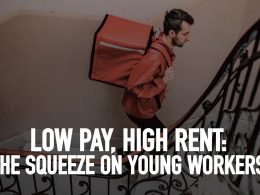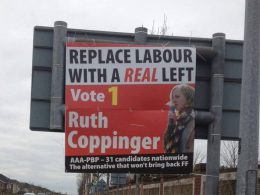By Eddie McCabe
Sinn Féin’s official review of its poor results in the local and European elections not surprisingly singled out immigration as being the decisive issue in it losing the ‘trust and support’ of its base. This analysis fits neatly into the commentary of the mainstream political analysts, whose generally right-wing opinions Sinn Féin is keen to court. As such, the main action that’s come from this review is the publication last week of an eight-page policy document on refugees and the international protection system – advocating a stricter asylum process but little the party hasn’t already come out with.
This announcement also followed a week of racist violence in Dublin, including numerous arson attacks, at the site of a factory in Coolock that’s being prepared to accommodate 550 asylum seekers. These events were instigated and coordinated by far-right agitators, including some newly-elected councillors from other parts of the City. These forces target their vitriol at both the left and Sinn Féin even more than at the Government, which is adding to the pressure Sinn Féin is buckling under, shifting it further to the right.
Entrenching a move to the right
In the typically shallow analysis of the political and media establishment (as well as the Government and the far right), the simplistic notion is put forward that Sinn Féin’s base, particularly in working-class communities, has shifted to a harder anti-immigration sentiment, but that Sinn Féin has been slow to harden its own position on immigration, leaving it out of touch. Sinn Féin’s review clearly accepts this view.
The problem for Sinn Féin is that it did harden its position on immigration before and during the elections. Its TDs and Senators have echoed the anti-immigrant tropes spouted by racist Rural Independent TDs in the Dáil, and have engaged in their own dog-whistling; they have repeatedly argued for more and faster deportations, including raising the prospect of deporting Ukrainian refugees (which even the Government hasn’t done); they have effectively supported the state clamp-down on homeless migrant encampments in Dublin City; and the party made its opposition to non-existent ‘open borders’ a prominent feature in its election material. Yet none of this worked to shore up its base during the elections.
The main proposals highlighted in the new document are: 1) that no accommodation centres for refugees should be located in deprived areas and there should be proper consultation with communities; 2) that staff and resources for the international protection system should be tripled, so that the processes of both integration and deportation can be sped up; and 3) that there should be no private profiteering involved in the system.
In short, there is nothing radical or even new in the policy. Much of it is in line with the Government’s own policy, differing only in how it might be implemented. And while cloaked in language about its “Republican values” of “equality, economic and social justice, sovereignty, anti-racism and anti-colonialism”, there’s no question that the purpose of this document is to harden Sinn Féin’s position on immigration and further its shift to the right – away from those ‘values’. It makes a point of criticising the lack of deportations ordered, the lack of enforcement of those that are ordered, and argues for expanding the number of countries deemed safe by designating some as “partially safe”, i.e. making the process more restrictive and difficult for many (already traumatised) applicants.
This is a clear capitulation to the far right’s disgusting anti-refugee ideas, and will only have the effect of adding legitimacy to them. It is a deplorable betrayal of all migrants, people of colour, women and LGBTQ people who are daily living with the consequences of the far right’s toxic impact. A principled left position is one that states resolutely that refugees fleeing war and persecution, and indeed economic migrants fleeing poverty, should be welcomed here and afforded the right to contribute to society – including by joining the struggle against the real threat to workers and communities: the capitalist class and its representatives. Indeed, the main beneficiaries of the hostility to refugees in working-class neighbourhoods are the Government and the wider capitalist establishment whose landlord- and developer-serving policies are let off the hook.
A weak capitalistic policy
Ending profiteering by private companies and engaging in more serious consultation with communities are proposals that obviously make sense. But they don’t solve the problems as long as they’re implemented within the framework of more general capitalist policies, which is exactly what Sinn Féin envisions. So, far from a radical policy to tackle the problems around the lack of resources in communities, particularly the lack of affordable housing, Sinn Féin’s policy is merely a tweaking of the Government’s existing awful policy, which is creating opportunities for the far right to organise.
Furthermore, its policy has been legitimately criticised by journalists and commentators for being deliberately vague on many issues. For example, when asked which more well-to-do areas should accommodation centres be located in instead of the more deprived areas, Sinn Féin reps have refused to give an answer. This is a problem for Sinn Féin, however, because even in more affluent parts of the country there are still dysfunctional and inadequate services – lack of GPs, school places and public transport. Few if any communities have the services that could cope with hundreds of people being brought in overnight. But Sinn Féin’s policy not only ignores this, but – again operating within a restricted capitalist framework – makes no demand whatsoever for more resources for any community. In fact it seems to just accept the existence of deprivation as a given.
In reality, the problems surrounding the issue of immigration – aside from those stoked by hateful far-right forces – relate precisely to the deprivation in working-class communities, which is the result of decades of right-wing policies, privatisation and austerity. These have to be reversed, which necessitates seriously challenging the capitalist status quo. Moreover, this deprivation and the shortage of public services exist alongside the incredible wealth and profits being amassed by the super-wealthy and big business in Ireland. Any discussion about solutions to these issues that ignores this fact – that makes immigrants and not capitalist inequality the focus – is a total deception, but one Sinn Féin is seemingly content to be part of.
The left path not taken
In reality, the drop in Sinn Féin’s support while connected with immigration is significantly related to its conservative, rightward shift on a whole range of issues. This is a trend that’s been ongoing for many years now, but has accelerated since the last general election – when it did adopt a more radical posture. The more Sinn Féin speaks and acts like a party that is seeking to be part of rather than upend the establishment, the less motivation people looking for real change have to support it.
By following the superficial mainstream and far-right analysis of immigration being central, Sinn Féin has completely disregarded the potential to win support from those seeking radical left-wing change – including in the sizable youth vote it received in 2020. Had Sinn Féin used its considerable resources and its platform as the main opposition party to really challenge the false and vile anti-immigrant ideas emanating from the far right and increasingly embraced by the Government, the whole discourse in society could have been different. Instead, it chose to accept and echo those ideas itself. It’s worth noting that even the staunchly pro-establishment Labour Party has adopted a stronger anti-racist stance.
As a result, not only has Sinn Féin’s response to the rise of the far right been unprincipled from any sort of left perspective; it has been utterly self-defeating. Its weak response to the pressure has been a gift to both the far right and the Government, by allowing the debate to move onto terrain on which Sinn Féin can’t possibly come out on top. But as Sinn Féin’s outlook is firmly set within the parameters of the capitalist status quo, it can’t see any real alternative to the Government’s approach, and the clear conclusion of its review indicates that it intends to continue with this unprincipled and self-defeating approach.
PBP’s mistaken appeal
In the aftermath of the local and European elections, People Before Profit (PBP) reissued its call for a ‘left alliance’ to take on Fianna Fáil and Fine Gael. Specifically, this would take the form of a ‘Vote Left – Transfer Left’ pact between PBP, Sinn Féin, the Social Democrats, and left independents. This same call was made before the recent elections, but was effectively rejected by the other forces.
We’ve written about this before and will do so again more extensively, but while of course sympathetic to the desire to see a left government in Ireland, we feel that PBP’s call is a significant political mistake – made all the worse given the increasingly disgraceful stance Sinn Féin is taking on immigration. This will no doubt result in some people questioning PBP’s own motives and politics. The truth, which is becoming more and more apparent, is that a Sinn Féin-led government would not be a left government in any meaningful sense, and giving the impression that it would both misleads people about what a left government would and must be, and what Sinn Féin is actually offering.
In its open letter to Mary Lou McDonald, PBP wrote: “We write to you as a party that has often found itself on similar sides in battles for progressive change and against the Fine Gael/Fianna Fáil political establishment.” Such unqualified pronouncements give a one-sided and false depiction of what Sinn Féin represents and where it’s headed – to the right, not the left. Indeed, if the issues regarding immigration cited above were not enough evidence of this, Sinn Féin’s support earlier this month for the inherently racist law that would allow for the revocation of naturalised citizenship surely is – a policy creating a two-tier citizenship with people of colour disproportionately represented in the category with fewer rights.
If PBP’s real intention in making these calls is to expose to potential Sinn Féin voters that Sinn Féin is not actually serious about being part of a potential ‘left government’, because it won’t agree to PBP’s modest demands (to rule out coalition with FF and FG, to not engage in scapegoating of asylum seekers, and to agree a programme of investment into public services), then this tactic is both unnecessary and if anything counterproductive. It’s unnecessary because Sinn Féin is making its rightward shift increasingly clear to people all by itself, and it’s counterproductive because PBP’s repeated references to a left alliance and left government involving Sinn Féin is in fact giving Sinn Féin left cover precisely as its rightward shift is accelerating.
A united front against racism
It is the responsibility of those on the left to call Sinn Féin out on its rotten stances. Its hardening position on immigration is a break with the anti-racist positions it adopted in the past, such as its correct opposition to the racist Citizenship referendum in 2004. If there are any opposing views within Sinn Féin they should be encouraged to prevent Sinn Féin sinking any further into the racist swamp, which is not in anyone’s interest – least of all those minorities who suffer from racism.
Moreover, it remains the case that, along with the left, Sinn Féin is the main target of the nefarious forces of the far right. And while ultimately the only way to really defeat the far right is through building a genuine and principled left – politically and organisationally; all tactics to stem its rise must be utilised. Sinn Féin should be called on to adopt a genuinely anti-racist position and join with others – the political left and trade unions – to combat the far right’s hate, lies and division in our communities.
Again, however, the indications are that Sinn Féin will not respond to such calls (it hasn’t thus far), and the battle against the far right is too serious and too urgent to be in any way reliant on Sinn Féin. The left, the trade unions, anti-racist and community campaigns, must take on this fight. Crucially, it must involve activating and organising en masse the working-class people, particularly young people, who are repulsed by the far right, and whose active resistance is vital to stopping its growth – growth that’s being fuelled by the Government’s policies, and unfortunately Sinn Féin’s too.












